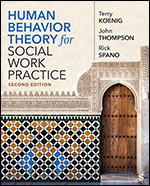Preface
About the Authors
Acknowledgments
Chapter 1: Introduction to Theory and Its Application to Social Work Practice
How This Book Is Organized
Does Theory Really Matter? Theory Myth Busters
The Interactive Abstract/Concrete Continuum
Meta-Theories as Overarching Theories: Their Contributions to Practice
Chapter 2: Critique of Theory for Use in Social Work Practice
Introduction to Analysis and Critique of Theory
What Does This Theory Say About Human Behavior?
How Does This Theory Address Growth and Change?
How Holistic Is This Theory?
How Consistent Is This Theory With Social Work Values and Ethics?
What Are the Sources of Knowledge That Support This Theory?
Chapter 3: Contextualizing Human Behavior Theory
Rationale for the Chapter
Assumptions Regarding Our Discussion of HBSE Theories and Their Connection to Practice
Defining Historical Context
Application of Historical Context Framework
Historical Context Questions Applied to the Late 1800s to 1920
Chapter 4: Critical Theories
Critical Theories and Their Roots in Marxism
Broad and Narrow Definitions of Critical Theory
Key Themes in Critical Theory and Its Development
Three Branches of Critical Theory: Feminist Criticism, Critical Race Theory, and Queer Theory
In-Depth: Paulo Freire (1921–1997)
Application of Critical Theories to Social Work
Classroom Exercises: The Application of Critical Theory to Social Work Practice Examples
Chapter 5: Psychodynamic Theory
Brief Introduction to Freudian Ideas
Key Conceptual Elements of Freud
Psychodynamic Theories’ Early Influences on Social Work Practice
Extensions of Psychodynamic Theory
Application of Psychodynamic Theory
The Application of Psychodynamic Theory to Case Examples
Connections to Usefulness in Practice
Chapter 6: Systems Theories
Introduction to Systems Theories
In-Depth Exploration of Systems Theories as Applied to Social Work Practice
Social Work Frame of Reference Based on Systems Theory
Current Conceptualization of the Life Model
Application of the Life Model to Social Work Practice: Eco-Maps, Genograms, and Beyond
Chapter 7: Environmental and Ecological Theory in Social Work
Connecting Social Work With the Natural Environment
Is Environmental Thought New?
In-Depth: Arne Naess and Deep Ecology
Critique of Environmental and Ecological Theory
Social Work’s Historical Relationship With the Natural Environment
Social Work and the Natural Environment: Current Developments
Summary of Social Work and the Natural Environment
Chapter 8: Life Span Theories, Family Life Course Perspectives, and Historical Trauma
Overview of Life Span Theories
In-Depth: Maria Yellow Horse Brave Heart and Venida S. Chenault
Critique of Life Span Theories and Beyond
Introduction to Social Work’s Understanding of Life Span Theory
Chapter 9: Symbolic Interactionism
Overview and In-Depth Examination of George H. Mead
Critique of Symbolic Interactionism
Application of Symbolic Interactionism Theory to Social Work Practice
Chapter 10: Behavior Theory, the Cognitive Turn, and the Influence of Mindfulness
Introduction and History of Behaviorism
Behavior Theory and Three Generations of Behavior Therapy
The Cognitive Turn and the First Generation of Behavior Therapies
Cognition and Second-Generation Behavioral Therapies
Third-Generation Behavior Therapies
In-Depth: Mindfulness East and West
Critique of Behavior Theory and Behavior Therapies
Application of Behaviorism to Social Work Practice
Chapter 11: Theories of Culture and White Privilege
Critical Consciousness for Ourselves and Our Clients
Anti-racism, White Privilege, and White Identity Development
Helms’s White Identity Development Model
Praxis as Action-Awareness-Reflection-Dialogue
In-Depth Theorist: Kimberlé Crenshaw and Intersectionality
Critique of Theories of Culture, White Privilege, Diversity, and Intersectionality
Application and Development of Diversity in Social Work Practice
Chapter 12: Empowerment Theory and the Strengths Perspective
Historical Context for Empowerment Theory
Key Themes in Empowerment Theory
In-Depth Theorists for the Strengths Perspective
Critique of Empowerment Theory and the Strengths Perspective
Application of the Strengths Perspective
Chapter 13: Cognitive and Moral Development Theories
Piaget and Cognitive Development
From Cognitive to Moral Development Theory
The Emergence of Kohlberg’s Moral Development Theory
Extensions From Piaget and Kohlberg
Current Trends in Moral Development
In-Depth: Carol Gilligan, Women’s Moral Development and Beyond
Critique of Cognitive and Moral Development Theories
Application of Cognitive and Moral Development Theories to Social Work Practice
Glossary
References
